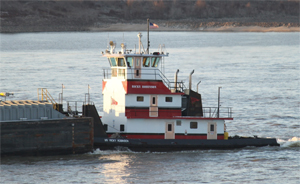Downflooding through unsecured deck hatches likely caused the fatal sinking of a fleet boat near Memphis, Tenn., in late 2017, according to federal investigators.
The 1,400-hp Ricky Robinson was upbound on the Lower Mississippi River when it sank at about 1130 on Dec. 8, 2017, at mile marker 732. Capt. Keith Pigram, 35, and deck hand Anquavious Jamison, 19, died in the incident.
National Transportation Safety Board (NTSB) investigators believe water came over Ricky Robinson’s bow and flowed into open hatches at the stern. Additional water likely reached the engine room through at least one open door on the main deck.
In its report, the NTSB cited Pigram’s decision to push upriver, with open aft hatches, at speeds that allowed water to spill onto the deck. However, the agency noted Ricky Robinson had recurring flooding issues in aft void spaces from an unknown source. Removing the water required opening the deck hatches and manually operating a submersible pump.
“Contributing to the sinking was the company’s inadequate oversight to ensure that crews kept hatches closed while the vessel was underway, and that ongoing watertight issues with the voids were addressed,” the report said.
Wepfer Marine of Memphis owns Ricky Robinson, which was built in 1976 but underwent extensive hull work during a 2010 dry dock. George Leavell, Wepfer’s executive vice president, did not respond to email messages seeking comment on the NTSB findings.
Pigram and Jamison began their 12-hour shift at about 0615 on Dec. 8. The offgoing pilot indicated the towboat was “all good,” but the offgoing deck hand told Jamison the forward stern void required pumping two or three times during his overnight shift. The towboat reportedly “leaned a bit” to starboard when water accumulated in the void.
The offgoing pilot confirmed the deck hand’s account, saying he asked the deck hand to pump the space “maybe twice” during the 12-hour shift. The pilot also acknowledged that at the beginning of his shift, an aft void hatch cover was off and there was about a foot of water inside. According to the NTSB, neither crewman reported the issue to Wepfer dispatch or management, who claimed they were unaware of the problem.
The NTSB learned that leaks in the forward stern void were reported in 2015, 2016 and again in February 2017. Each case was deemed to have been resolved. Subsequent investigation suggested water entered the vessel through the starboard rudder tube, although that could not be confirmed.
Ricky Robinson left a fleeting area at mile marker 730 at about 1100 for a four-mile voyage to an upriver intermodal terminal. The pilot aboard the Wepfer fleet boat Betsy Ross recalled that both of Ricky Robinson’s engine room doors were open when it departed.
The towboat made approximately 5 knots until about 1125, when NTSB investigators said Pigram turned hard to starboard toward the left descending bank. The vessel lost speed, then accelerated to a maximum of 6.5 knots. It was making 5.6 knots at 1126:28 when its telematic sensor sent its last signal.
Pigram made two distress calls between 1120 and 1130. One went out over Channel 10, the working frequency for Wepfer crews, and was heard by the pilot aboard Betsy Ross. The other came over Channel 11 and was heard by a dispatcher at a riverside fuel facility.
As he sped to the stricken towboat, Betsy Ross’ pilot looked down to the main deck “to ensure that his vessel was not taking water over the bow,” the NTSB report said. “However, when he looked up about 20 to 30 seconds later, according to his estimate, he no longer saw Ricky Robinson.”
Memphis police, the Coast Guard, numerous Wepfer boats and good Samaritans spent hours searching for Pigram and Jamison from the air and water. They spotted debris from the towboat but no sign of either man. Jamison’s body was later found in a portside washroom when Ricky Robinson was salvaged nine days later. He was wearing his work vest. Pigram’s remains have not been found.
After the salvage, investigators noticed that the hatches were open for the port and starboard aftermost voids and the forward stern voids. All four hatch covers were missing. There was no evidence suggesting the covers separated during the sinking, while underwater or during the salvage, the report said. Investigators noted that the starboard engine room door had been tied open.
During a post-accident dry dock, investigators looked for external or internal leaks on Ricky Robinson. They identified difficulties fully pumping out the stern void space and also found a cable canal that would have allowed rising water to travel from the void into the engine room.
“Ricky Robinson operating in a lightboat condition was at risk of taking water over the bow and thereby introducing water onto the main deck,” the NTSB report said. “Water then could travel as far back as the stern, where it could downflood into the tanks and voids through any open or unsecured hatches.”
Pigram’s abrupt turn to starboard — presumably in an effort to ground the vessel — likely contributed to the sinking, according to the NTSB. The towboat would have heeled to port during the turn, allowing water in the void to shift in that direction and worsen the lean, investigators said. The aft deck likely would have submerged, increasing downflooding. As the heel worsened, water could have flowed into the engine room through the open port-side door.
In a memo to the Coast Guard, Wepfer argued that Jamison was accountable for the sinking for “not keeping the hatch covers tight and not closing the engine room doors,” the report said. The company also cited Pigram’s speed in lightboat condition.
However, former crew told federal investigators that Ricky Robinson routinely operated with its watertight hatches and engine room doors open “despite the company’s checklist requiring closure of hatches,” the report said.
Approximately 200 gallons of diesel oil leaked into the river after the towboat sank. Damage to Ricky Robinson was estimated at $1.5 million.

